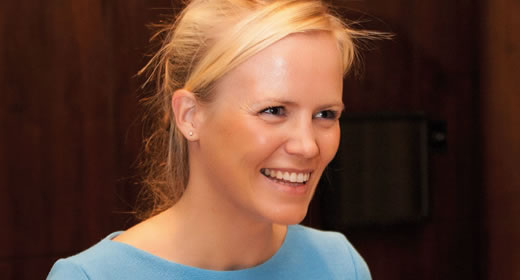
Knowledge is power for combatting violence against women
"So far, there aren't reliable statistics on domestic violence in Monaco," says Vibeke Brask Thomsen (MPP/MA '06), founder and director of GenderHopes. "It doesn't mean they don't exist, we just haven't found them yet." Finding accurate information–and using it to educate women, policymakers, and the public at large–is one of the central aims of this Monaco-based non-profit dedicated to combatting violence against women.
GenderHopes is still new, run by Brask Thomsen on a volunteer basis from her home, where she manages both local and international projects. Her voice and manner are buoyant, despite the serious work she undertakes. Together with Femmes Leaders Mondiales Monaco, she's preparing background research for a brochure to raise awareness about gender-based violence in Monaco–what the numbers are and where women can go for help.
"The people we've met with so far–the police, the social workers, the hospital, the Red Cross–have had no problem acknowledging that, just like anywhere else, domestic violence does happen here," she says. "And there is a good network of help for women in Monaco." That is not true in all cases, however. One population in Monaco that concerns Brask Thomsen is immigrant women, for whom not speaking the language (French) or not having a support network might make them less likely to report violence and, as a consequence, more vulnerable. "We look at that as well–how we can address domestic violence from both a local and an international perspective."
One way is for GenderHopes to promote women's political participation: Brask Thomsen hopes to establish a scholarship at the Ford School that would support students from developing countries and help them to become change agents in their home countries.
Another way is to make citizens aware of how violence against women in the developing world may stem from an array of causes. In Eldoret, a small town in western Kenya, GenderHopes has helped a local NGO present a series of events, such as roundtables with community leaders, to raise awareness about gender-based violence and demystify its origins. Such violence, Brask Thomsen points out, may be tied to cultural norms (female circumcision, for example).
Brask Thomsen's own commitment to this work began with her growing interest in how war and conflicts impact women. While at the Ford School, working with such faculty as Susan E. Waltz, she studied security, disarmament, and energy security. After graduation, she moved to Brussells and worked as a program officer at the International Security Information Service (ISIS Europe), where her supervisor and mentor specialized in gender issues. Having grown up in both Monaco and France, in 2011 she returned to Monaco and founded GenderHopes.
Brask Thomsen observes that, "Men might be out on the battleground, but how women are impacted in any type of conflict is very different. Women might be victims of rape or kidnapping, or they may not have access to reproductive care. It's very interesting to look at conflict through a woman's eyes."
Below is a formatted version of this article from State & Hill, the magazine of the Ford School. View the entire Spring 2013 State & Hill here.